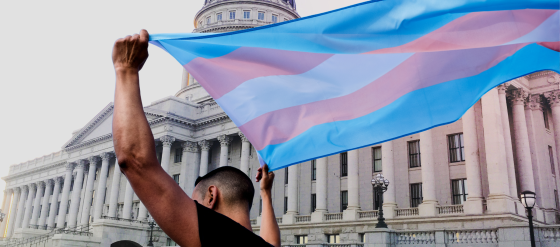Right to Protest, Free Expression, and Equal Protection - During their 2001 session, the legislature passed House Bill 322 Domestic Terrorism of Commercial Enterprises. Targeted at animal rights activists, HB 322 mandated enhanced penalties for "any criminal offense with the intent to halt, impede, obstruct, or interfere with the lawful operation of an animal enterprise or to damage, take or cause the loss of any property owned by, used by, or in the possession of a lawful animal enterprise," a designation that included, but was not limited to, farms, ranches, rodeos, and research facilities.
What was extremely troubling about HB 322 was its definition of a new crime called "commercial terrorism," which included a substantial amount of constitutionally protected expression and applied to any person and any business. According to the law, an individual was guilty of commercial terrorism if "he enter[ed] or remain[ed] unlawfully on the premises or in a building of any business with the intent to interfere with the employees, customers, personnel, or operation of a business." The definition of "enter" included "the intrusion of any physical object, sound wave, light ray, electronic signal or other means of intrusion under the control of the actor," and the law applied to any business or building. It would have, for example, made it a crime for demonstrators lawfully assembled on a public sidewalk to engage in verbal conduct targeting an individual business if any "light ray" (i.e., visual message) or any "sound wave" (i.e., audible message) intended to dissuade people from patronizing the business entered the premises. The law did not ensure that speakers will have a reasonable alternative channel of communication. To the contrary, the restrictions required demonstrators to be out of sight and earshot of the business they intend to protest, preventing them from reaching their intended audience. In addition, HB 322 specifically exempted speech under the National Labor Relations Act and the Federal Labor Railway Act, and therefore posed equal protection problems since all other individuals are prohibited from exercising their fundamental free speech rights to the same extent as union members.
On April 2, 2001, the ACLU of Utah and cooperating attorney Brian Barnard filed a lawsuit on behalf of the nonprofit organization Utah Animal Rights Coalition challenging the constitutionality of the new law, and on April 18, we filed a memorandum in support of plaintiffs’ motion for a preliminary injunction to keep the law from going into effect. On May 4, U.S. District Judge Bruce Jenkins granted our request for a preliminary injunction, seeing serious First Amendment problems with the statute. The next day, our clients were able to conduct their weekly anti-fur demonstration on a public sidewalk in downtown Salt Lake City without fear of being arrested and jailed for their free speech activities. On July 27, we filed a memorandum in support of plaintiffs’ motion for summary judgment asking the court to grant summary judgment for the plaintiffs, to declare the statute unconstitutional as a matter of law, and to permanently enjoin defendants from applying or enforcing the statute. In a hearing on October 10, Judge Jenkins agreed that the statute was unconstitutional and granted our motion for summary judgment.
